How Ant Group’s ANEXT Bank is empowering MSMEs and redefining financial inclusion in Singapore
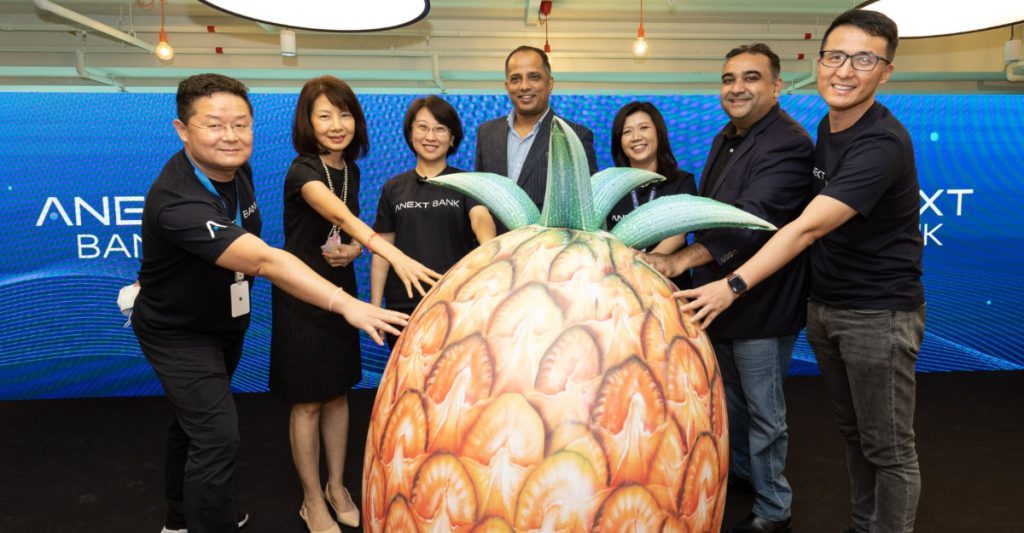
Since its launch in 2022, ANEXT Bank has become a prominent player in Singapore’s digital banking landscape.
A wholly-owned subsidiary of Ant Group, this fintech giant has taken the reins of digital banking, driving financial inclusion and empowering micro, small and medium-sized enterprises (MSMEs).
Its offerings aim to address the financial challenges faced by these businesses, and support their growth in this digital era.
Here is a look at how the bank has grown and the lasting impacts it has made on the MSME sector over the past year.
Providing underserved MSMEs with accessible financing
Although Singapore has a highly banked population, studies have shown that MSMEs are highly underbanked in the city-state, despite making up about 99 per cent of all companies in Singapore.
The global tightening of monetary conditions also does not make it easier for these businesses, especially when it comes to accessing financing. “According to the World Bank, [financing] is the second most cited obstacle facing SMEs to grow their businesses in emerging markets and developing countries,” said Toh Su Mei, CEO of ANEXT Bank.
This was why the bank introduced its ANEXT Business Loan last November, which offers a fuss-free and flexible unsecured financing solution. This initiative simplifies the loan application process and caters specifically to the needs of MSMEs.
The minimum loan amount starts from S$5,000, and no documents are required for loans under S$30,000.
– Toh Su Mei, CEO, ANEXT Bank
In addition to business loans, it also offers a comprehensive suite of financial services and expertise, including advisory services, which have proven to be vital to rapidly growing startups such as BRB Selfcare, an online platform that provides anonymous mental health therapy.
ANEXT Bank’s offerings have bolstered the growth of the business, enabling them to successfully navigate the complexities of expanding their business. Additionally, BRB Selfcare has also managed to streamline its cash flow management and financial operations.
“Having a banking partner that understands the unique needs and challenges of startups like ours is invaluable to our growth,” said Joylynn Tan, co-founder of BRB Selfcare.
Evolving financial services to cater to digital-first businesses

With COVID-19 propelling the shift towards digitalisation, the ANEXT Programme for Industry Specialists caters specifically towards the shifting dynamics of business models that adopt hybrid and digital-first approaches.
Launched back in November, the programme is a B2B solution that aims to empower MSMEs by granting them access to financing solutions through an array of industry partners.
As the programme continues to grow, the bank actively seeks partnerships with e-commerce marketplaces, fintech companies and digital solutions providers to support MSMEs’ cross-border operations.
As business models are shifting towards hybrid and digital-first, so should financial services, which have to evolve and be where SMEs are doing their businesses digitally.
We believe that innovation can be accelerated at scale when we join hands with like-minded industry and public sector partners to drive transformation and create greater value for SMEs.
– Toh Su Mei, CEO, ANEXT Bank
Notable partners, including key industry leaders such as fintech company IN Financial Technologies and business process management provider Bizmann System have joined the programme, with the potential to benefit the staggering number of 15,000 MSMEs that they serve.
Moreover, the bank’s extensive network has proven to be a catalyst to success, as exemplified by the experience of BRB Selfcare.
According to Joylynn, ANEXT Bank provided the startup with a gateway to connect with potential partners, investors and industry experts, which have subsequently “opened doors to strategic collaborations” and expanded its reach.
Reimagining financial inclusivity for all MSMEs

But to those who are not so digitally-savvy, the bank also offers inclusive and accessible solutions to access financing easily, in line with its goal to reimagine financial inclusion. Its clients today include businesses from industries that are not typically digital, such as the trade industry, as well as the building and construction industry.
We’ve been clear from the start when we set out to reimagine financial inclusion to deliver accessible and effortless solutions securely.
This way, business owners, no matter their industry or digital competency, can access financing easily and without worries.
– Toh Su Mei, CEO, ANEXT Bank
One of the ways the bank achieves this is through its simple and streamlined onboarding process. Singapore-incorporated businesses can initiate their ANEXT Business Account application online, with their Corppass credentials, which automatically pre-fill their application with relevant information.
The user-friendly digital services offered by the bank have helped multiple clients, including BRB Selfcare. In fact, it has allowed the startup to focus on its core mission of providing therapy, while relying on ANEXT Bank for simple, yet accessible financial services.
ANEXT Bank also goes the extra mile by incorporating enhanced security measures into its services, such as its three-factor authentication feature that utilises facial recognition to authenticate transactions. By prioritising the security of SMEs, ANEXT Bank not only simplifies their financial interactions but also instills confidence in the integrity and safety of their transactions.
In addition to supporting businesses regardless of their digital competency, the bank also supports the expansion of foreign businesses into Singapore to boost the city-state’s local economy.
In fact, ANEXT Bank is the first bank in Singapore to provide remote, virtual onboarding services for those based overseas with a registered business in Singapore. By leveraging these services, foreign entrepreneurs can set up their businesses with ease, minimising both the time and expenses involved.
Establishing closer collaborations with MSMEs
Today, 78 per cent of ANEXT Bank’s Business Account customers comprise micro businesses. Moreover, an astounding 51 percent of ANEXT Bank’s business loan customers comprise MSMEs, solidifying the bank’s vital role in providing support to these enterprises.
By understanding and addressing the unique challenges faced by MSMEs, ANEXT Bank has positioned itself as a trusted partner for their growth and success.
In line with their commitment to serve the evolving needs of these enterprises, the bank has now introduced a new initiative – SME Friends of ANEXT. This innovative program enables ANEXT Bank to establish closer collaborations with MSMEs, allowing them to gain deeper insights into the pain points and challenges faced by these businesses.
While ANEXT Bank has already made significant strides in its journey to support MSMEs, the digital bank is far from done. Riding the wave of positive month-on month growth, the digital bank aims to double down on their customer-based approach. This includes continuing their efforts to build financial solutions that meet SMEs’ needs and to be tech driven and innovative in order to offer their customers a secure and simple user experience. .
Furthermore, ANEXT Bank has set its sights on expanding its services to benefit more regional SMEs. By tapping into the growing and interconnected digital economy, ANEXT Bank aims to empower these enterprises with the opportunities and advantages offered by global markets.
Featured Image Credit: ANEXT Bank
Also Read: A business bank that pays interest? Ant Group’s ANEXT rethinks banking for the next generation
3 months after leaving Fave, founder Joel Neoh joins CircleDNA as managing director

“After 15 years, I’m switching into a new industry… without any prior experience,” Joel Neoh, the Malaysian entrepreneur behind consumer fintech platform Fave, wrote on a LinkedIn post.
Those keeping tabs on the industry will know that Joel Neoh left Fave, which he founded in 2015, back in March 2023.
His plan was to take a “much-needed” break and go on travel adventures that were, in fact, already scheduled until mid-2024.
However, on June 5, 2023, it was announced that Joel will be joining Prenetics Global Limited (Prenetics), a NASDAQ-listed company, as its chief consumer officer (CCO).
He will also be taking charge of CircleDNA, which is wholly owned by Prenetics, as its managing director.
With Joel as the CCO of the group, the goal is to further expand CircleDNA into a leading consumer preventive healthcare platform.
A global healthcare platform
Prenetics is a genomics and precision oncology company that’s operational in 10 countries with a team of over 800 members.
Meanwhile, CircleDNA is its healthcare platform best known for offering consumer DNA tests worldwide. It allows users to access health information and reports about their genetic make-up through its mobile app.
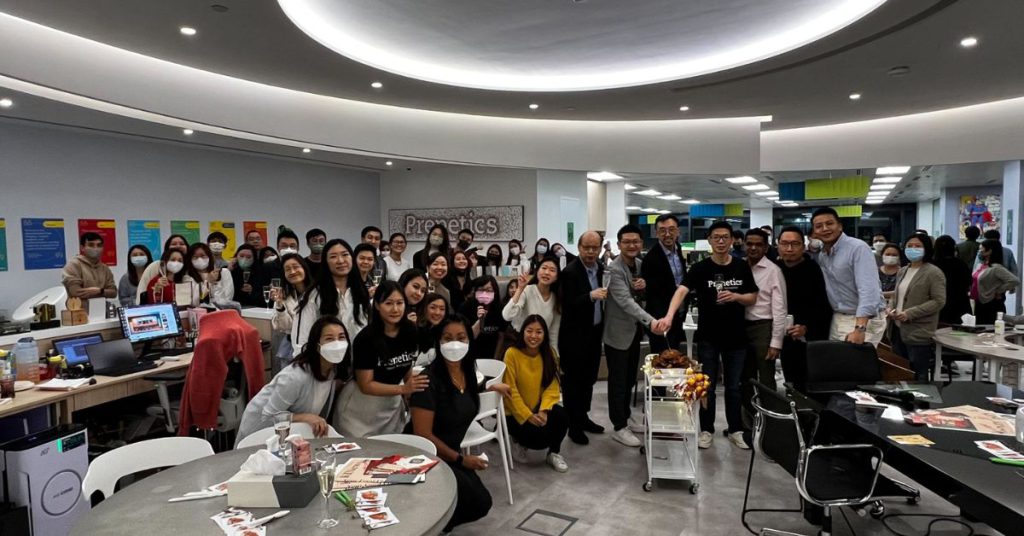
According to the press release, Joel’s appointment comes at a time when Prenetics is working to “reinvent the preventive healthcare landscape”. It aims to do so through its focus on consumer health and genetics, technology for early cancer detection, and targeted therapy for cancer treatment.
CircleDNA is also working to broaden its reach into the domain of preventive and personalised healthcare management.
This means it will work towards local country partnerships to incorporate a wide spectrum of services such as blood tests, telehealth services, personalised supplements, and online to offline healthcare services.
With all these new products and services scheduled to roll out over the next 12 months, it seems like Joel will have a lot on his plate, especially considering his newness to this industry.
“I’m learning an incredible amount each day about genetics, healthcare, new cancer technology, and the wealth of invaluable insights offered by our scientist community has been eye-opening,” he shared in the press release.
A personal connection
Braving this new frontier was never in Joel’s plans. In the press release, the Fave founder shared that it was through casual conversations with Danny Yeung, the CEO of Prenetics as well as a business partner and close friend of Joel’s, that led to this unexpected turn of events.

“Can you believe it?” Joel himself questioned in his LinkedIn Post. “I can’t, and neither would my biology lecturer in college.”
Rather than healthcare and biotech, Joel has been involved in the consumer technology space since 2009. He spent the last eight years focused exclusively on payments and fintech.
“I’ve dedicated over 10,000 hours to build and invest in products that would empower the next generation of financial institutions,” he recalled.
If you’ve heard of the 10,000-hour rule by Malcom Gladwell, you’ll know this means Joel has invested the time needed to attain expertise and mastery over a given field. So, to start seemingly from scratch in a new field seems surprising, if not daunting.
“However, somewhere along this journey, a realisation struck me,” he wrote in his post. “While I was helping people manage their finances and build wealth, there is no true wealth without good health.”
Joel also opened up, sharing that in the past 12 months, he experienced the loss of a best friend, a close uncle, and a dear colleague.
“These heart-breaking experiences left me no choice but to reassess my path and make a change.”
Stepping up to the challenge
In the past few months, Joel shared that he has embarked on a journey across multiple countries and engaged in conversations with countless healthcare professionals.
“I’ve immersed myself in their wisdom, capturing their insights to significantly broaden my understanding,” he said.
One thing he learnt through these conversations was that there was an immense amount of work to be done to advance healthcare for the betterment of humanity.
“Realising the immense potential for us to positively affect people’s lives, helping them to live healthier and happier, I made a conscious decision to shelve the vacation and join the cause,” he expressed.
Despite his lack of experience in healthcare, Joel undoubtedly brings with him a wealth of experience in the consumer tech sector as well as expertise as a startup founder and leader.
“While many have cautioned against changing industries later in one’s career, I am committed to this decision,” he said.
Recalling a pearl of wisdom given to him by a friend, Joel concluded: “Don’t be afraid to start over. It’s a chance to build something better this time.”
Also Read: Role-play as Friends characters & gossip over endless coffee at this coworking pop-up in KL
Featured Image Credit: Joel Noeh, Prenetics chief consumer officer & CircleDNA managing director
M’sian insurtech startup PolicyStreet bags RM67 million in Series B funding led by Khazanah
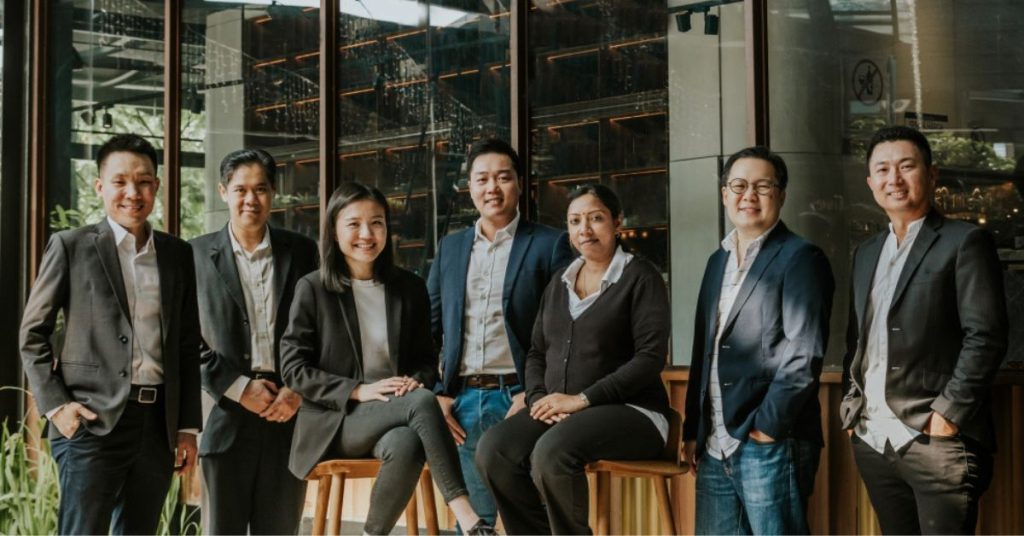
Less than two years after it bagged RM25 million in a Series A fundraising round, insurtech (insurance technology) startup PolicyStreet has bagged US$15.4 million (RM67 million) in its series B round.
According to a June 6 press release, the fundraising was led by Khazanah Nasional Berhad’s Dana Impak mandate.
Dana Impak is a RM6 billion allocation over five years and is a key pillar under Khazanah’s Advancing Malaysia strategy, with the aim to increase Malaysia’s economic competitiveness, build national resilience, as well as deliver socioeconomic impact to Malaysians.
On a mission to deliver impact
In a statement, it was shared that Khazanah’s investment in PolicyStreet complements its Future Malaysia Programme which aims to support the local startup ecosystem of entrepreneurs, startups, venture capital, and corporate venture programmes through collaboration with domestic and international partners.
The Future Malaysia Programme supports investments into companies with sustainable business models that deliver socioeconomic impact to Malaysia, such as PolicyStreet, which requires the injection of risk capital.
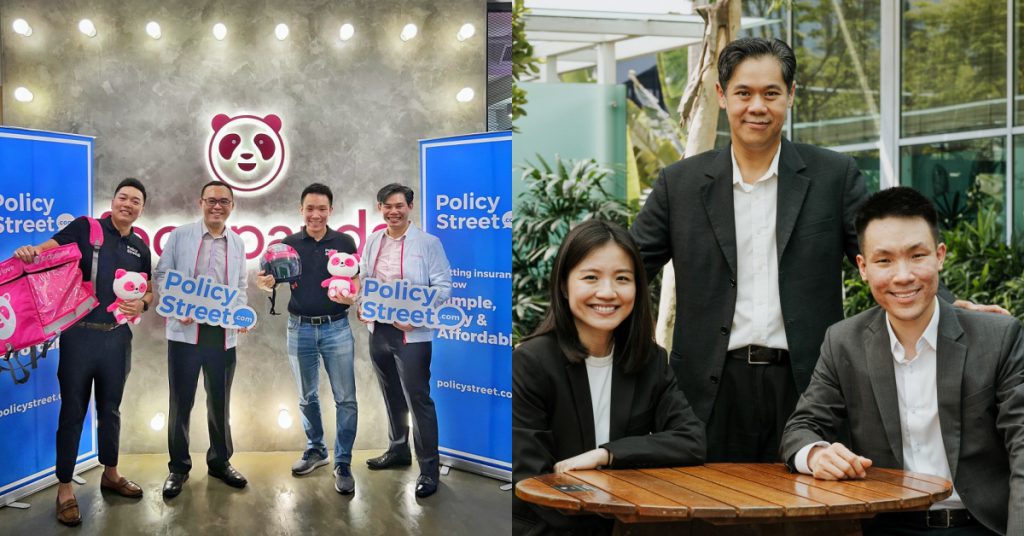
Dato’ Amirul Feisal Wan Zahir, Khazanah’s managing director, said, “Our investment in PolicyStreet aims to improve insurance penetration within the unserved and underserved segments which advocates inclusivity, providing better financial protection, increasing household resilience, and financial well-being.”
As Dana Impak seeks to create socioeconomic impact in all its investments, Khazanah has applied its impact assessment framework, the SEMARAK Initiative, to the investment evaluation process.
Khazanah’s impact thesis is premised on how innovative insurance solutions provided by insurtechs like PolicyStreet, offer accessible and meaningful coverage to the unserved and underserved which, in turn, enhance financial protection, household resilience, and promote financial well-being for Malaysians.
Strengthening its technology and capabilities
Yen Ming Lee, PolicyStreet’s CEO and co-founder, said, “PolicyStreet is committed to empowering underinsured businesses and consumers by providing accessible insurance solutions.”
PolicyStreet’s recent fundraising round also garnered strong support from other local and international investors, including Altara Ventures, Gobi Partners, and Spiral Ventures.
The insurtech startup intends to use the fresh funds to strengthen its technology and underwriting capabilities.
Specifically, they aim to increase its on-demand underwriting policies to make protection more accessible. This will let the team better tap into underserved and underinsured audience segments in Malaysia and the region.
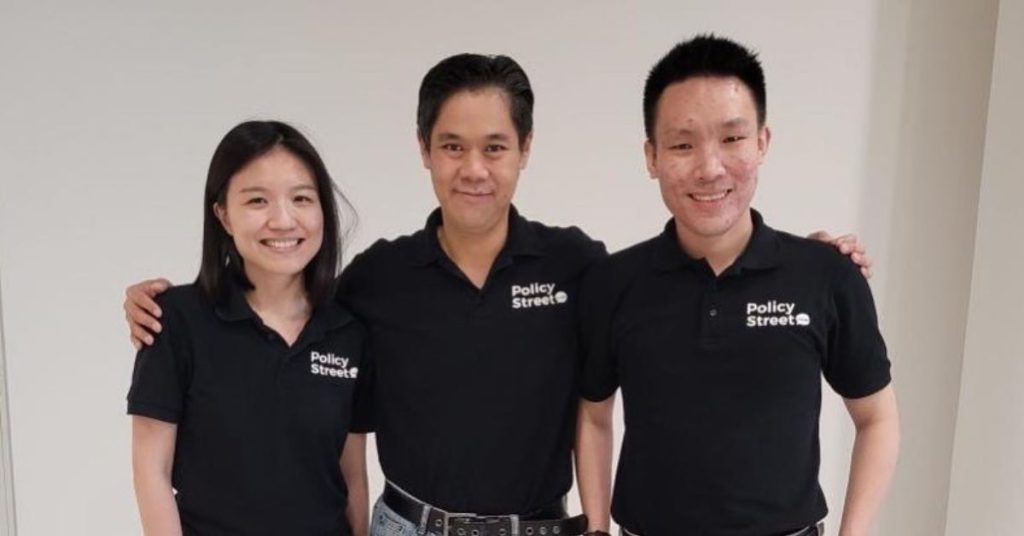
According to Dave Ng, general partner of Altara Ventures, “As their Series A lead investor, we are proud of PolicyStreet’s achievements to date. They grew their business five times in 2022 and achieved a sum insured of over US$6 billion, serving over five million customers.”
“In this fundraising round, we doubled down on our support for this amazing team. We are excited and look towards assisting the company’s efforts in regional expansion.”
Founded in 2017 by Yen Ming Lee, Wilson Beh, and Winnie Chua, PolicyStreet is a full-stack insurtech company that offers digital and customised insurance solutions to consumers and businesses.
PolicyStreet secured Financial Adviser and Islamic Financial Adviser licences from Bank Negara Malaysia (BNM) in 2019, enabling it to work with over 40 insurance and takaful providers to provide financial advice, education, and claims support to its customers.
It has also obtained the Reinsurer and General Insurer licences from the Labuan Financial Services Authority (LFSA) in 2021.
Also Read: When not cooking at a Michelin-starred spot, this M’sian is designing Japanese chef knives
Featured Image Credit: PolicyStreet
airasia Superapp & Grab S’pore have both launched dine-in features, here’s how they differ

Great minds think alike, they often say, although some may tack on the less positive “fools seldom differ” addendum.
In any case, both Grab and AirAsia seem to be on the same page about something—dine-in features.
Both platforms rolled out some dine-in services on June 1, with the airasia Superapp rolling out its “discounted dine-in reservation” service and Grab launching GrabFood Dine-in BETA.
Given, GrabFood Dine-in BETA is now only available in Singapore. However, it might be safe to assume that this feature might eventually make its way to Malaysia should it go well.
So, what exactly are these dine-in features about?
The big idea
GrabFood Dine-in BETA is supposed to be a feature that helps make things convenient for consumers to “discover, decide on, and travel to their next dining venue”.
Here, users can look up restaurants to eat, view menus, and consumer reviews. They’re also able to pre-purchase dine-in vouchers and book rides to the restaurants, though that latter part is something people have always been able to do.
Essentially, it functions like Yelp as well as Groupon.
According to Tay Chuen Jein in the press release, the head of deliveries at Grab Singapore, this offering is related to the increased number of dine-ins post-pandemic.
Meanwhile, airasia’s new feature, which is powered by a restaurant reservation platform eatigo, lets travellers discover new restaurants in various cities they’re travelling to, including Kuala Lumpur, Jakarta, Bangkok, Chiang Mai, Pattaya, and Phuket.
This dine-in feature also offers discount rates of up to 50% off as well as 100 airasia points with every reservation.
This news follows the recent partnership announcement between airasia Superapp and foodpanda. The platform had already teased the increased focus on dine-in offerings during the partnership announcement.

“With the transition of our food delivery option being powered by foodpanda, we’re now fully focused on the offerings that we are able to provide as part of a travel superapp, starting with this new feature,” said Tan Suan Sear, head of airasia food.
How the app works
Scrolling through the app, it seems like airasia has already partnered with a lot of notable restaurants, particularly ones in hotels, for its dine-in reservation service.
Some big names include Lemon Garden @ Shangri-La KL, Contango @ The Majestic Hotel Kuala Lumpur, and Fei Fan Hot Pot.
Interestingly, the head of airasia food had shared that the feature is supposed to benefit tourists who are looking to try the “best and most authentic local cuisines” as well as the “best hidden gems”.
However, based on the options it’s providing so far, at least in Malaysia, they hardly seem to meet the “authentic local” and “hidden gem” descriptors.
The locations supported by the app’s dine-in feature seem to include Bukit Bintang, Petaling Jaya, Kuala Lumpur, Klang/Shah Alam, Cheras/Ampang, Bangsar, Damansara, Puchong, Old Klang Road, Mont Kiara, Subang Jaya, Putrajaya/Cyberjaya/Seremban, Kepong, Genting Highlands, and Sri Petaling.
The discounts offered are time-dependent, so a reservation at 7PM could give you 10% off, but could be more at another hour, for example.
Capturing the Malaysian market
Since airasia made the first move on offering dine-in services in Malaysia, this might mean it’ll have a leg up on GrabFood Dine-in BETA when (or if) it launches here.
However, it’s not always true that the first mover is the one that’s better or has the advantage. It would be interesting to see how GrabFood Dine-in may tweak or improve its offerings once it’s out of its beta stage, and how it will then compare to airasia’s.
- Read other articles we’ve written about airasia here.
- Read other articles we’ve written about Grab here.
Also Read: When not cooking at a Michelin-starred spot, this M’sian is designing Japanese chef knives